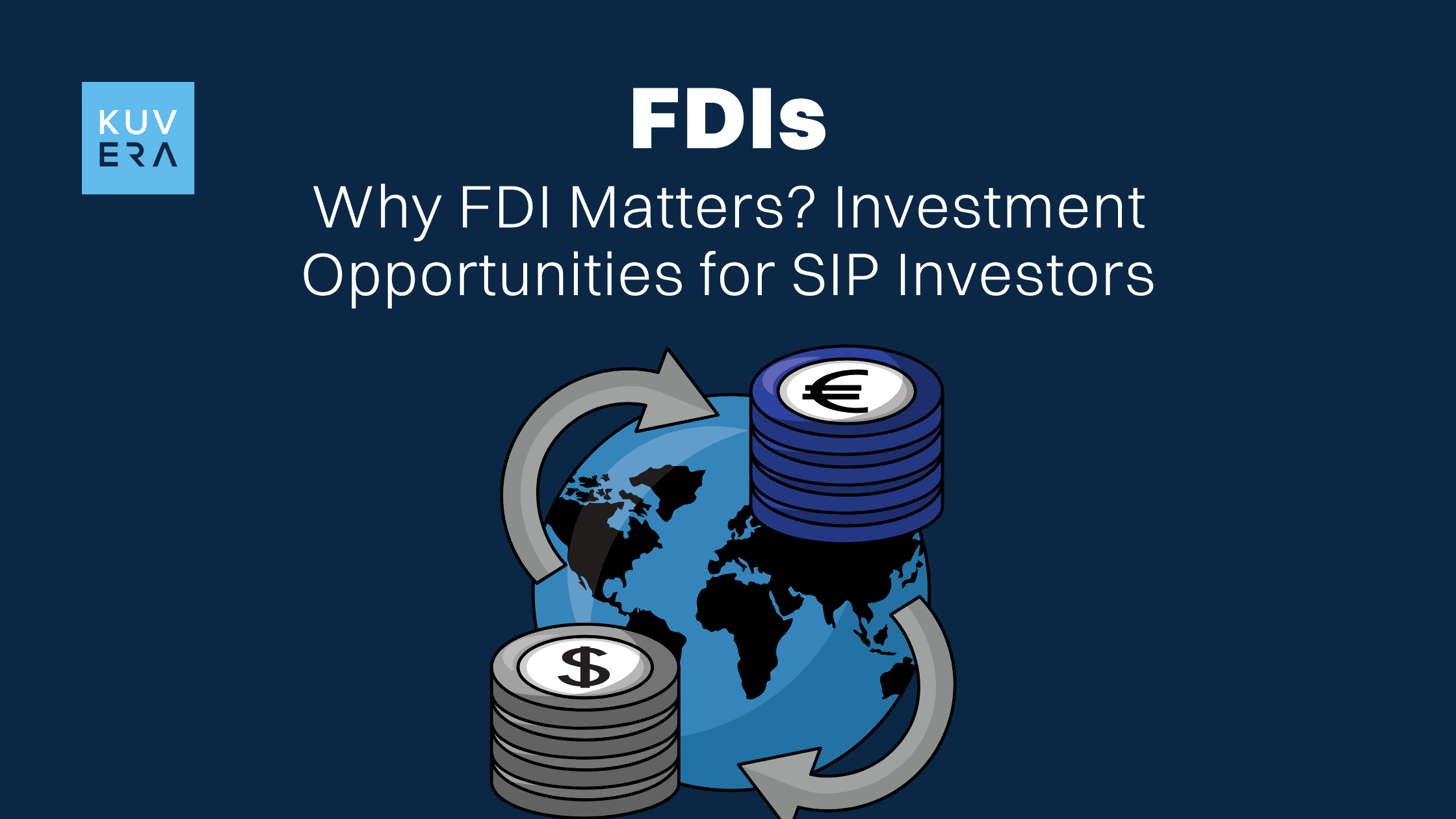India’s Trajectory as a Global Economic Powerhouse Relies on a Confluence of Factors, with Foreign Capital Playing An Undeniably Pivotal Role.
While The Market Frequent Buzzes with Discussions Around the Short-Term Fluctuations of Foreign Portfolio Investments (FPIS) or Foreign Institutional Investors (FIIS), IS the more environment Transformative Impact of Foreign Direct Investment (FDI) That Fundamentally Reshapes a Nation’s Economic Landscape. Understanding what is FDI and its deep significance is paramount for every investment, particularly there steadily building wealth through systematic investment plans (sips).
This Detailed Blog Will Explore whose Matters So Profoundly For India, Delve Into Its Various Forms, Clarified Its Distinction from Other Foreign Capital, Foreign Capital, and Unveildi Opportunities It Creates for Sip Investors.
What is FDI? A foundation for lasting growth
The FDI full form is Foreign Direct Investment. When we spendk of fdi Meaning, we refer to a long-term investment made by a company or individual in one country to installing a lastic interest in anterprise located in another. This is far more than simply buying shares on a stock exchange. INTEAD, FDI involves a tangible committee, often through Ventures.
What is FDI in Practice Within India?
It Manifests as Foreign Automotive Companies Establishing Manufacturing Plants, Global Tech Giants Setting UP Research and Development Center, or International Retail chains opening stores. These investments are not passive; They Signify Active Involvement in Management and Operations, Aiming for Strategic Expaniation and Sustained Presence. This commission to the real economy is a hallmark of fdi in India.
Types of FDI
FDI can take several forms, economy uniquely to the host economy’s development:
1. Horizontal FDI
This Occurs when a company invests in a foreign firm that operates in the same industry as its domestic operations. For example, a european car manufacturer building a new factory in India directly compets with and complements existing automotive players.
2. Vertical FDI
This involves investment in a foreign company that is either a supplier or a distributor in the investment company’s supply chain. A global beverage company investment in an Indian packaging firm is an example of vertical fdi.
3. CONGLOMERETE FDI
This type of fdi involves investment in a foreign company in an entryly unrelated industry. While Less Common, It Contributes to Diversification of the Host Economy.
4. Platform FDI
Here, a company invests in a foreign country primarily to use it as a base for expert products or services to other counts. This boosts the host nation’s expenses capabilites.
These diverse types of FDI collectually brings Substantious Beyond Mere Capital, Fostering a More Robust and Integrated Global Economy.
FDI vs. Other Foreign Capital
To truly grasp bey fdi matters, it is essential to distrust forms of Foreign Capital that Flow INTO INTO INTO INTO INTO IN, Such as Foreign Institutional Investment (Fii) (FPI).
1. FDI vs Fii
The core FDI vs FII distinction lies in Intent and Control. FII (Foreign Institutional Investment) Refeers to passive investments made by Large Foreign Financial Entities (Like Mutual Funds, Pension Funds, Pension Funds) Into Publicly Traded Sacharities focus on short-to-medium-term Financial returns. They are typical hold smaller stakes and do not seek management control. FDI, Conversley, is a long-term, strategic investment that implies significant ownership and activation in the management of the foreign entity. It builds physical assets and creates jobs directly.
2. FDI vs FPI
Foreign Portfolio Investment (FPI) is a broader category that now encompasses fii. The key differentce between FPI vs FDI is similar: FPI is liquid, short-term, and primarily driven by financial return, without conferring managment contract. FDI Involves Illique, Long-Term Capital with Significant Ownership and Strategic Objactives.
This critical difference highlights that while FPIS Contribute to Market Liquidity, FDI plays a more fundamental role in Sustainable Economic Development.
Why FDI matters so much for India’s growth story
The consistent and growing inflow of fdi in India is a powerful catalyst for the nation’s economic program for Several Compeling Reasons:
1. Capital Infusion and Economic Growth
FDI directly Injects Much-Needed Foreign Capital ITO Critical Sectors, Supplementing Domestic Savings. This additional capital finances infrastructure projects, Industrial Expensation, and Technological Upgrades, Directly Boosting India’s Gross Domestic Product (GDP) and access domestic product (gdp) Development.
2. Job Creation and Skill Development
When Foreign Companies Establish or expand operations, they create direct Employment Opportunities Across Various Industries. Furthermore, they often brings Advanced Training Methodologies, Leading to Skill Development and Enhancing The Capability of the Local Workforce, Contributing to Human Capital Development.
3. Technology Transfer and Innovation
A Significant Benefit of FDI is the Transfer of Cutting-Edge Technologies, Advanced Manufacturing Processes, and R&D Capables from Global Players to India. This infusion of new knowledge and techniques boots productivity, fosters innovation, and elevates India’s’S Competitiveness on the Global Stage.
4. Increased Productivity and Efficiency
The Entry of Foreign Companies often Introduction Global Best Practices in Management, Production, and Supply Chain Efficiency. This compels domestic firms to improve their own operations to compes, lead to overall efficiency gains and higher productivity across industry.
5. Export Promotion and Balance of Payments
Many FDI ventures are established with an eye on Leveragging India’s Cost Advantages and Large Workforce to Produce Goods for Global Markets. This boosts India’s expenses, helping to improve the nation’s balance of payments by brings in Foreign Exchange.
6. Infrastructure Development
Substantial FDI often targets core infrastructure sector like transportation, energy, and logistics. Improved infrastructure not only supports the operations of foreign enterprises but also Lays a Strong Foundation for broader Economic Development, Attracting Eveen more Investment.
7. Stimulating Domestic Investment
The presence of foreign investors can act as a signal of confidence, encouraging domestic businesses to expand and invest further. It can also lead to the development of robust ancillary industry to support the larger FDI-Backed Ventures.
Investment Opportunities for Sip Investors in an FDI-BOSTED Economy
For Individuals Diligently Building Wealth Through Systematic Investment Plans (SIPS), The Sustained Flow of Fdi in India Creates a Powerful Underling Tailwind, Indirectly Shaping a more Robust Opportunity-Rich Investment Landscape.
1. Fundamental Economic Strength
The Direct Impact of FDI on GDP Growth, Employment, and Productivity Creates a Fundamentally Stronger Domestic Economy. This Robust Economic Environment Provides a Stable and Fertile Ground for Indian Companies to Thrive, Which in Turn Translates Into Better Corporate Earnings and, CONSEQUENTLY, CONSEQUENTLY EARUTIES FORUTIES. Your Ongoing Sip Investment Directly Benefits from this broad-based economic uplift.
2. Targeted Sectorral Growth
FDI often Flows Into Specific Sector Identified for Growth, Such as manufacturing, renewable energy, digital infrastructure, and specialized services. SIP Investors with Mutual Funds Have Exposure to these sectors are well-postioned to capitalise on the accelerated growth Driven by these foreign capital inflows. Diversifying your Sip Investment Plan Across Such Sector Can Be a Smart Investment.
3. Enhanced Corporate Performance
Companies that receive FDI or Operate in Sector Benefiting from it often gain access to new technologies, global markets, and improved management practices. This can lead to superor Financial Performance, which reflects positively in their stock prices and subsequent boots the navs of equity mutual funds. Undrstanding What is SIP Investment’s Connection to this long-term Growth is key.
4. long-term confidence
The inrent long-term nature of FDI INTILLS Confidence in the Indian Market’s Sustainable Growth Trajectory. This reduces systemic risk and enhances the overall attractiveness of investment in Indian equities for the long haul. For a long-term sip investment, this stability is invaluable.
5. Beneficiary of Policy Reforms
The Indian Government’s Continuous Eforts to Liberalize FDI Policies, Streamline Regulations, and improve the ease of doing business further encourage these inflows. As these reforms successed, Various sectors and companies Benefit, Creating a Conducative Environment for Mutual Funds to Deliver Stronger Returns for Sip Investors.
Wrapping up
FDI REPRESENTS A Profound and Enduring Commitment to a Nation’s Economic Future. IT Signifies Much More Than Just Financial Capital; It is a conduit for technology, expertise, and long-term visitor. Undersrstanding why FDI matters Deeply for India’s Economic Progress, from Job Creation and Skill Development to Technological Advancement and Export Promotion, Provides invaluable contest for investor. For there steadily Pursuing Wealth Creation Through a Sip Investment, The Sustained and Increasing Flow of Fdi in India Lays a Strong Foundation for Robust CORPORATE GROWTH and, Ultimate Returns on their investments.
Interested in how we think about the markets?
Read More: Zen and the art of investment
Watch here: Learn about the F & O Craze in India



